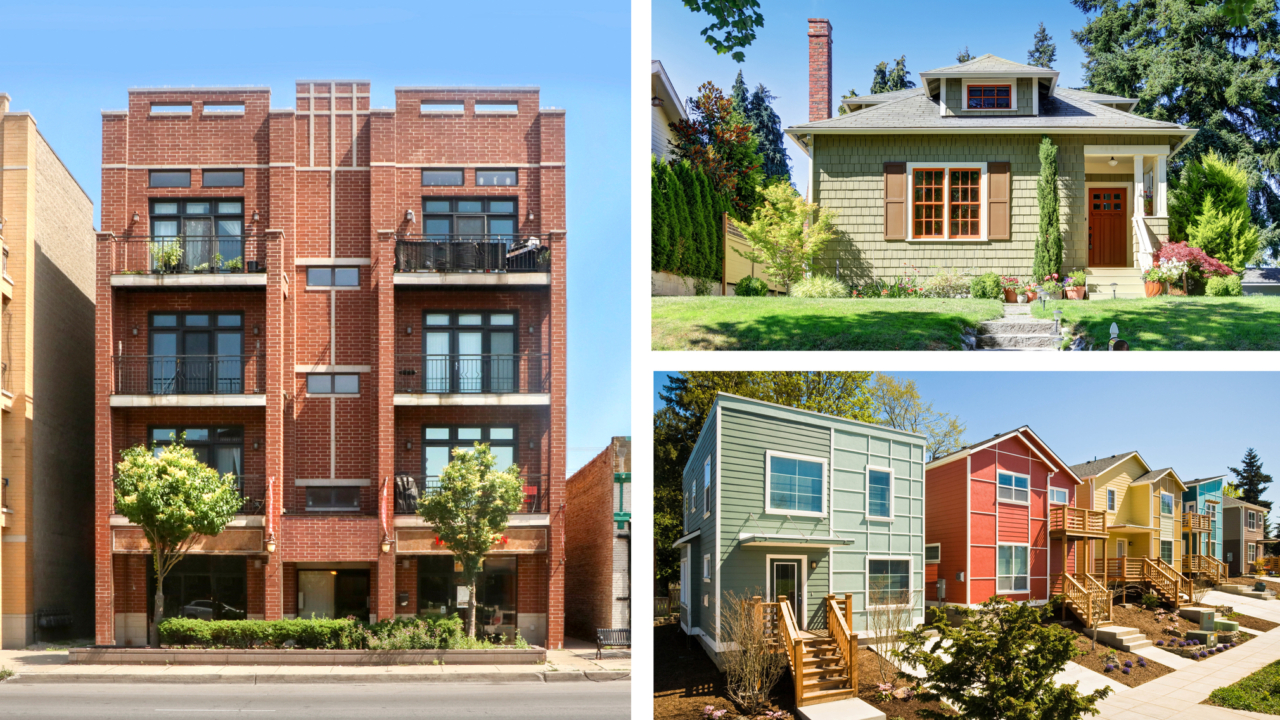How to Buy a House at Auction


Written by Shawnna Stiver on April 23, 2025
Key takeaways
- Auctions have trade-offs: Auctions offer the potential for below-market prices but often require all-cash payment and quick closing.
- Properties are typically sold “as-is,”: Sometimes auctioned homes don’t offer the chance for inspection or interior viewing.
- Do your due diligence: Research the property, check for liens, and set a firm budget to avoid overbidding.
For buyers looking to score potential deals or unique investment opportunities, house auctions present an alternative path to homeownership.
House auctions, or foreclosure auctions, remain a significant segment of the real estate market. But how do housing auctions work, and what should potential buyers consider before bidding? Here’s what you need to know about buying a house at auction.
What is a house auction?
A house auction is a public sale where properties are sold to the highest bidder, often due to foreclosure, tax liens, or financial distress. Some of the most common reasons for homes to be auctioned include:
Foreclosures: When a homeowner defaults on their mortgage, lenders may take ownership of and sell the mortgaged property in an auction to recover the amount they’re owed.
Tax delinquencies: When homeowners fail to pay property taxes, local governments may place a tax lien on the home. If the debt remains unpaid, the government may auction the property to recoup the owed taxes.
Estate sales: When heirs inherit a property they don’t want to keep, they may opt to sell it at auction. Estate sales can occur due to financial constraints, family disputes, or simply a desire for a quick sale.
Bank-owned properties (REOs): If a home fails to sell at a foreclosure auction, it becomes real estate owned (REO) or bank-owned by the lender. The bank may then auction the property in an effort to recover some of its losses.
How do housing auctions work?
Not all housing auctions operate the same way; some guarantee a sale to the highest bidder, while others set minimum price requirements or allow sellers to reject bids. How bids are placed at an auction can significantly impact your buying approach. An auction with an open bid allows you to see and react to competitors’ offers, while an auction with a blind bid keeps all amounts hidden until the sale is final. Knowing the differences can help you strategize effectively when bidding on a house to buy at auction.
Types of auctions
Here’s a breakdown of the three most common types of real estate auctions.
Absolute Auction: The highest bid wins, regardless of price.
Minimum Bid Auction: The auction starts at a predetermined minimum bid.
Reserve Auction: The seller sets a hidden reserve price, and bids must meet or exceed it for a sale to occur.
Types of bids
There are two primary bidding structures at auction:
Opening bidding: Bidders can see and respond to each other’s offers.
Blind bidding: Bidders submit offers without knowing competing bids.
Five steps to buying a home at auction
Successfully purchasing a home at auction requires preparation, strategy, and financial readiness. From researching properties to securing financing and placing a winning bid, each step plays a crucial role in ensuring a smooth transaction. Follow these five key steps to navigate the auction process with confidence.
1. Research the property
In most regions, notices about upcoming auctions are published online or in the local paper. Of course, you can also find pre-foreclosures and bank-owned properties for free through Zillow. Zillow also posts foreclosure auction information on homes, including location, date and time. Be aware that auction dates often change or are postponed, so be sure to confirm specifics with the lender’s attorney or the trustee.
- Narrow your area: Choose a few neighborhoods to research. Drive by the listed auction properties located within those neighborhoods and observe the area.
- Study the home: You probably won’t be able to get into the home, but you should be able to tell if anyone is living there. If it is occupied, there’s a good chance the home has working plumbing and electricity, but this is not guaranteed. What does the exterior look like? Expect the house needs, at the very least, cosmetic upgrades: new carpet, paint, appliances and kitchen cabinets.
2. Set a budget
If you win this property at auction, will you live in the house? Fix it and resell it? Rent it out? Your plans for the property will affect your maximum bid price.
- Compare: Find out what similar properties nearby have sold for in recent months. You may want to consult with a local Premier Agent who can help you navigate the process. Real estate professionals will do a comparative market analysis (CMA) for comparable sales (or "comps") to estimate a home’s market value.
- Research: Use Zillow's Foreclosure Estimate to help determine what the home will likely sell for.
- Add in the cost of improvements: Calculate necessary improvements based on a worst-case scenario (replacing plumbing, electrical, etc.). The average cost of home improvements ranges from $1,540-$4,302 with some renovations costing as much as $20,000.
- Include closing costs and fees: Plan for closing costs between 2% to 5% of the property price. Estimate your closing costs with our closing cost calculator. Also, be aware of the buyer’s premium, which typically adds 5-10% to the purchase price and goes to the auction company.
Remember that your bid at the auction is absolute; there is no backing out, and you typically won’t be able to inspect the home until after you’ve purchased it. If you think basic repairs for a house will run $15,000, you don't want to end up paying $130,000 at auction if the move-in-ready home next door is listed at $140,000.
Make a set of photos and info sheets for each property — along with your top bid — just to avoid confusion on auction day.
3. Secure financing
Auction purchases often require immediate funds, so go into the day knowing your financing is secured. Most real estate auction contracts have no financing contingencies. In a nutshell, “no contingencies” means that you have to secure funds or financing prior to the auction. You must be pre-approved and not pre-qualified for a loan. A pre-approval requires a prospective buyer to produce more documentation, fill out an application with a lender, and disclose their financial background to the seller.
If you’re ready for a pre-approval, apply for a mortgage with a lender near you. When you apply for financing, request the highest amount you would be willing to spend on the property. Do your homework to figure out what the property is worth and contrast that with what you’re able to afford. Take into account the potential competing bids that you may encounter, plus additional fees and closing costs.
4. Register for the auction
Registering for an auction is a crucial step, as you’ll need to meet specific requirements before being allowed to participate. Each auction house or online platform has its own process, but here are some common steps you may have to take to register:
- Pre-registration: Many auction companies allow or require buyers to pre-register online before the auction date. This may include submitting personal identification, proof of funds, and agreeing to the auction’s terms and conditions.
- Registration on-site: If attending a live auction, plan to arrive early to complete any necessary paperwork and receive a bidder number or paddle. Some auctions may require you to show your financial pre-approval or proof of available funds at this stage.
- Deposit requirements: Bring the earnest money deposit in the form of cash, certified check, or cashier’s check. This deposit may be required to gain entry or participate in bidding.
- Understanding auction rules: Each auction has specific bidding rules, payment deadlines, and purchase conditions. Review these carefully to avoid surprises.
- Online auctions: Some platforms require credit card verification, and bidders may need to place a refundable deposit before being allowed to bid.
- Due diligence: Review auction terms, property disclosures, and bidding increments beforehand so you know what to expect.
If you win, be prepared to pay a deposit, which is usually 5-20% of the property’s value, within three days and complete the remaining payment within the required timeframe.
5. Place a bid
Arrive on time the day of the auction because the action moves quickly and being late could mean you miss out. Observe the first few sales. Early properties often sell for less, because bidders are gauging pricing trends. Pay close attention to what the auctioneer says. Phrases like “subject to all liens” can mean additional financial obligations. Know your limits and stick to your predetermined budget to avoid a bidding war.
What to know about the closing process: Most real estate auction sales close within 30-45 days. Unlike traditional home sales, auction closings rarely experience delays. This fast timeline requires buyers to have financing secured and paperwork ready. Missing deadlines can lead to losing both the home and your deposit.
Pros and cons of buying a house at auction
Buying a house at auction can be an exciting opportunity to secure a property at a potentially lower price, but it also comes with risks. While some buyers enjoy the speed and competitive pricing, others may struggle with limited property access and financial uncertainties. Before diving in, it’s essential to weigh the advantages and disadvantages.
Pros
- Potential cost savings: Homes at auction can sell for below market value.
- Quick closing process: Most auction sales close within 30-45 days.
- Less competition: Auctions may attract fewer buyers compared to traditional listings.
Cons
- Limited inspection access: Buyers may not have the chance to inspect the interior.
- Immediate payment required: Winning bids often require cash or pre-approved financing.
- Risk of additional liens: Some properties have unpaid debts or structural issues.
Is buying a house at auction a smart move?
Buying a house at auction can be rewarding, but it’s not for everyone. By doing thorough research, setting a firm budget, securing financing, and staying disciplined at the auction block, you can successfully navigate the world of housing auctions and potentially score a great deal on your next home.
However, if you prefer inspections, contingencies, and a less pressured process, traditional home buying may be a better fit. Our Premier Agent partners are ready to help you find and buy a home you’ll love.
A local agent can help you stay competitive on a budget.
They’ll help you get an edge without stretching your finances.
Talk with a local agent


